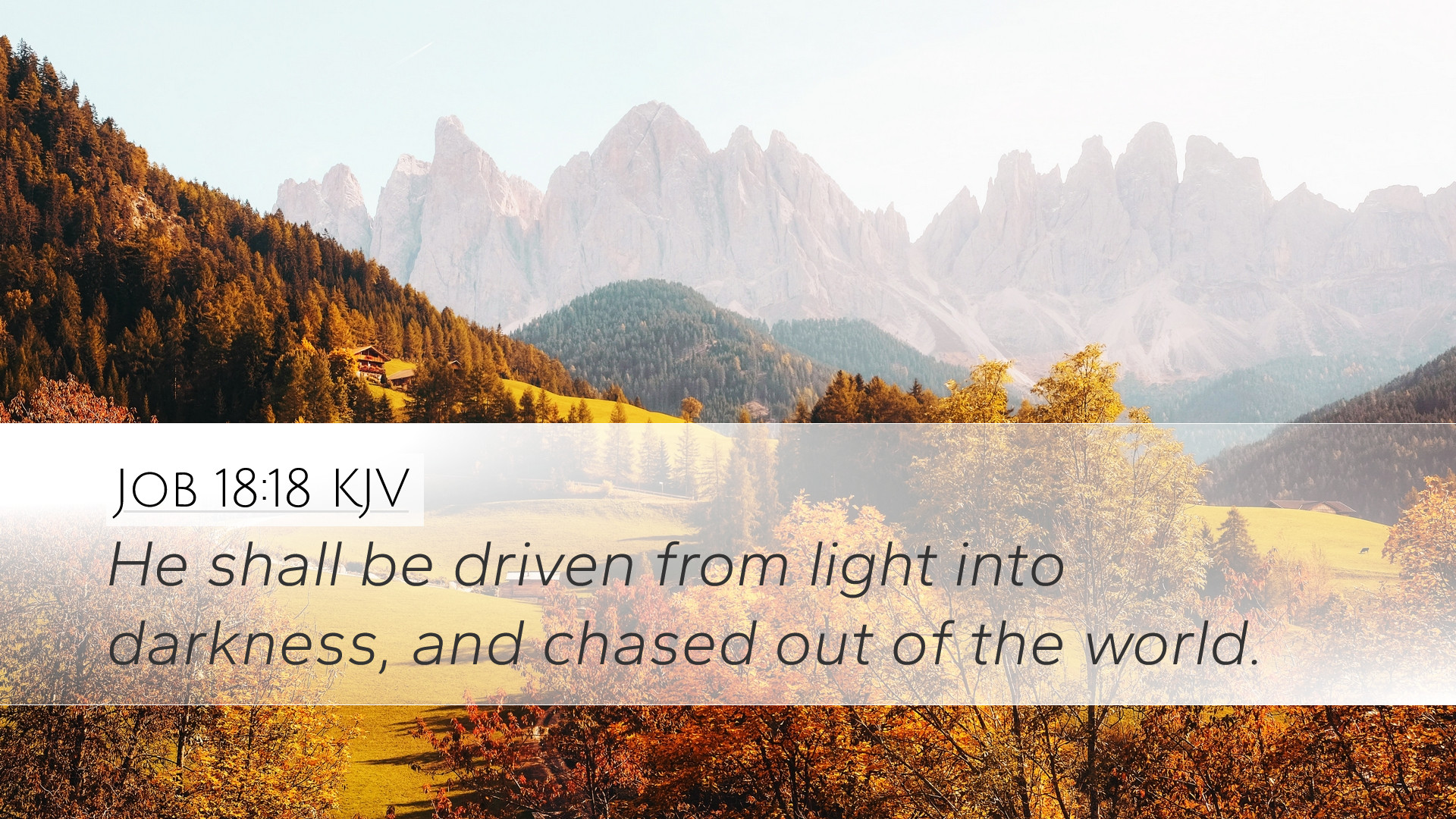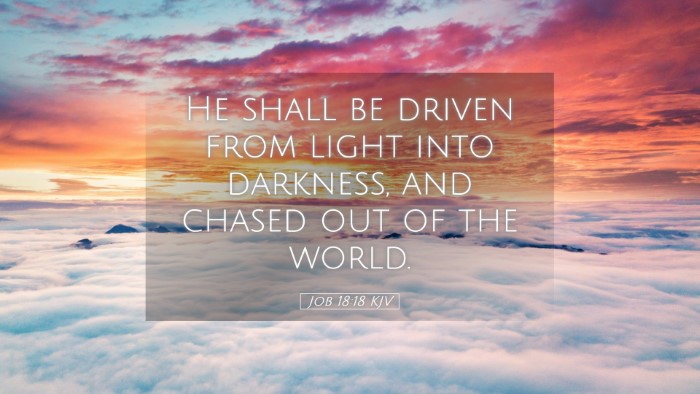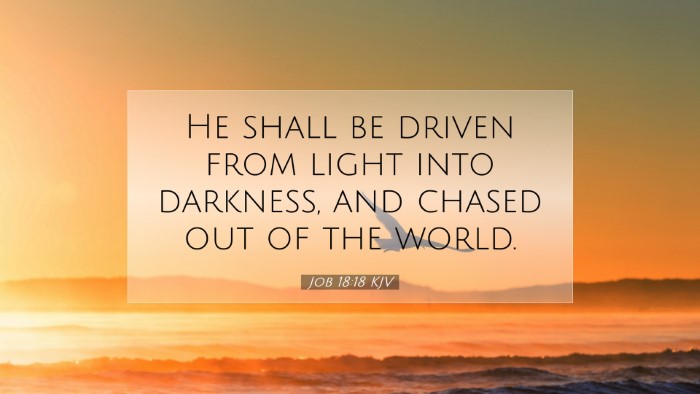Old Testament
Genesis Exodus Leviticus Numbers Deuteronomy Joshua Judges Ruth 1 Samuel 2 Samuel 1 Kings 2 Kings 1 Chronicles 2 Chronicles Ezra Nehemiah Esther Job Psalms Proverbs Ecclesiastes Song of Solomon Isaiah Jeremiah Lamentations Ezekiel Daniel Hosea Joel Amos Obadiah Jonah Micah Nahum Habakkuk Zephaniah Haggai Zechariah MalachiJob 18:18
Job 18:18 KJV
He shall be driven from light into darkness, and chased out of the world.
Job 18:18 Bible Commentary
Commentary on Job 18:18
Verse Reference: Job 18:18 - "He shall be driven from light into darkness, and chased out of the world."
Introduction
The text of Job 18:18 presents a vivid depiction of judgment and exclusion. This verse is a part of Bildad's speech, where he articulates the fate of the wicked. The language employed serves as a stark warning, revealing the consequences that befall those who oppose God and His righteousness.
Historical Context
To fully appreciate the implications of Job 18:18, it is critical to note the context of the Book of Job. The poem unfolds amid the dialogues between Job and his friends, who attempt to discern the reason for Job's suffering. Bildad's argument rests heavily on traditional wisdom and the belief in retributive justice, where evil deeds are met with calamity.
Insights from Matthew Henry
Matthew Henry expounds on this verse by emphasizing the metaphorical transition from "light" to "darkness." This imagery reflects a complete reversal of fortune, where prosperity is extinguished. Henry notes that the "light" symbolizes God's favor and blessing, while "darkness" suggests a state devoid of God's presence and assistance.
Henry further draws parallels to the ultimate fate of the unbeliever, stating that being "chased out of the world" indicates not just earthly judgment but an eternal separation from God—a theme echoed throughout Scripture.
Insights from Albert Barnes
Albert Barnes provides a poignant commentary regarding the inexorable nature of divine justice as highlighted in this verse. He interprets the phrase "driven from light into darkness" as a divine act where the wicked are forcibly removed from the blessings of life into despair.
Moreover, Barnes elaborates on the expression "chased out of the world." He points out that it signifies both temporal and eternal exclusion, as the wicked are destined to experience isolation from the divine presence post-mortem. This highlights the severity with which God treats wickedness, establishing a moral order that cannot be overturned.
Insights from Adam Clarke
Adam Clarke, expanding on the emotional weight of Bildad's assertion, reflects on the implications for individual morality and communal ethics. He posits that this verse serves as an admonition not only for Job but also for all who will heed the warning of turning away from folly.
Clarke highlights that the vivid imagery of darkness evokes a feeling of dread and hopelessness, corresponding to the ultimate fate of those estranged from God. His commentary serves to reinforce the prophetic nature of Bildad's words, suggesting a timeless truth applicable to all generations.
Theological Implications
Job 18:18 occupies a significant place in the theological conversation about justice, suffering, and divine retribution. The emphasis on light versus darkness invites deeper reflection on one's walk with God and the consequences of sin.
Divine Justice
The verse encapsulates the theme of divine justice, underscoring that God's judgment is both severe and inevitable. The notion that the wicked will be expelled into darkness emphasizes that earthly life is but a precursor to eternal realities.
Human Agency and Responsibility
The implications extend beyond mere punishment; they call into question the human agency in relation to divine justice. Those seeking to understand their circumstances must reflect upon their moral actions and spiritual alignment. Indeed, this echoes throughout the biblical narrative, where righteousness is always upheld as the path to true life.
Application for Today
For contemporary pastors, students, and theologians, Job 18:18 offers significant insights for preaching, teaching, and personal application. The promise of God’s justice serves as both a comfort and a warning.
Encouragement to Reflect
- Self-Examination: Individuals are encouraged to examine their lives in light of God's standards. This verse serves as a prompt for self-reflection regarding one's relationship with God.
- Warning to the Unrepentant: Those who persist in rebellion against God are cautioned of the dire consequences awaiting them, not merely during this life but extending into eternity.
- Hope for the Righteous: Similarly, those who strive for righteousness can find hope in the assurance that God sees their efforts and rewards them accordingly.
Conclusion
Job 18:18 stands as a compelling reminder of divine retribution and the stark dichotomy between light and darkness. Through insights from Matthew Henry, Albert Barnes, and Adam Clarke, we gather a multi-faceted understanding of this verse that enriches our theological perspective and spiritual application.
As we navigate the complexities of life, this verse invites us to remain steadfast in our faith, dedicated to pursuing righteousness and embracing the light of God's truth.


